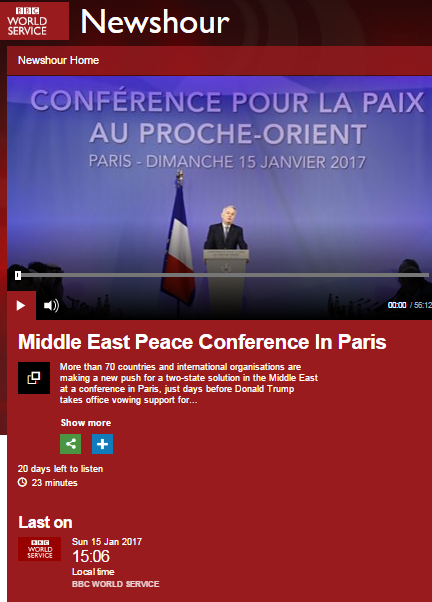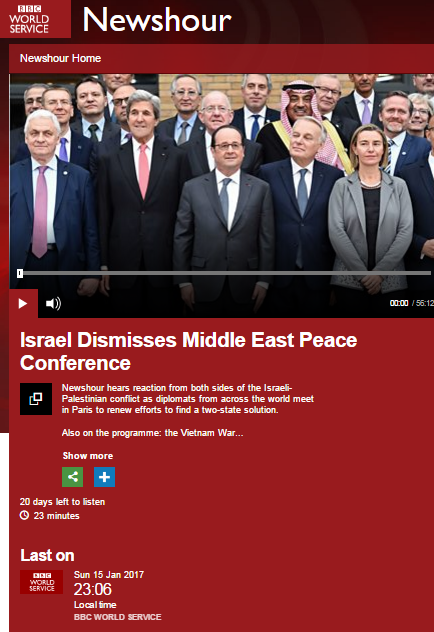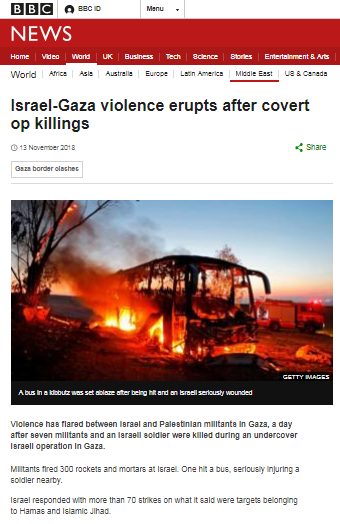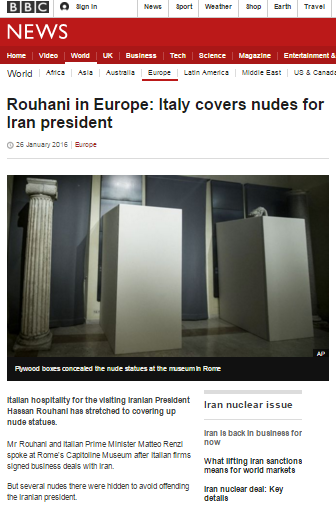The afternoon and evening editions of the January 15th BBC World Service radio programme ‘Newshour’ – both presented by James Menendez – included coverage of the Paris conference which took place that day.
Menendez’ introduction to that lead item in the afternoon edition (from 00:87 here) steered listeners towards inaccurate conclusions regarding the absence of Israeli and Palestinian participants in that conference by failing to clarify that neither party had been invited.
“But first to that big international meeting being held in Paris right now to try to resuscitate the moribund Middle East peace process. More than 70 countries are taking part but the fact that the two protagonists – Israel and the Palestinians – aren’t, well it tells you everything you need to know about the scale of the task ahead and in particular, the task of reviving the idea of a solution based on two states living side by side in peace. It’s 23 years since the signing of the so-called Oslo Peace Accords but a Palestinian state looks like a more remote prospect now than then.”
After listeners heard archive recordings relating to the Oslo Accords and following a clip from John Kerry’s speech in late December, Menendez introduced his first interviewee [from 03:50] – PA Minister of Education Sabri Saydam.
Menendez: “Well today’s conference in Paris is aimed precisely at restarting an international commitment to that two-state solution. But will it make any difference at all? Well let’s hear now from both sides and first, the Palestinians; presumably they welcome the fact that this conference is taking place. Sabri Saydam is a senior official in Fatah, the Palestinian party that controls the West Bank.”
Listeners then heard Saydam claim that all Palestinians support the two-state solution.
Saydam: “For every Palestinian this is a recipe for consensus and this is a reflection on the will of the international community and this is a reminder both to the American administration that the UN resolutions would have to be upheld and for Israel that the end of occupation is imminent.” [emphasis added]
That obviously inaccurate claim was not challenged by Menendez either at that point or later, when Saydam went on to suggest that all Palestinians believe that “the two-state solution is the only workable formula”.
Menendez: “Does it make any difference though?”
Saydam: “Maybe not for the Israeli government that exists right now; the right-wing government that believes in the policy of expansion of settlements and believes in the continuation of the occupation. Yet for Palestinians it makes a world of difference. Remember, this comes after a few weeks of the decision taken by the Security Council deeming settlements – Israeli settlements – as illegal. So for Palestinians this is a reassurance that the two-state solution is the only workable formula.” [emphasis added]
The interview continued with questions from Menendez on topics including the new American administration and the possible relocation of the US embassy to Jerusalem and with Saydam promoting the narrative – unquestioned by his host – according to which the Palestinians support a two-state solution but are thwarted by Israel.
An abridged version of that interview – including the above unchallenged statements – was also broadcast [from 26:38 here] in the evening edition of ‘Newshour’ on the same day.
The BBC knows perfectly well that Hamas (together with additional Palestinian factions) does not seek a negotiated peaceful solution to the Arab-Israeli conflict. In its own profile of the terrorist organisation the BBC writes:
“Hamas is designated a terrorist organisation by Israel, the US, EU, Canada and Japan due to its long record of attacks and its refusal to renounce violence. Under the group’s charter, Hamas is committed to the destruction of Israel. […]
Hamas came to prominence after the first intifada as the main Palestinian opponent of the Oslo peace accords between Israel and the Palestine Liberation Organisation (PLO). […]
Hamas resisted all efforts to get it to sign up to previous Palestinian agreements with Israel, as well as to recognise Israel’s legitimacy and to renounce violence.
Hamas’s charter defines historic Palestine – including present-day Israel – as Islamic land and it rules out any permanent peace with the Jewish state.”
Nevertheless, in all its recent reporting of UNSC resolution 2334 and the Paris conference the BBC has framed the story as being about a “moribund”, “fading” two-state solution which is endangered primarily by Israeli construction of housing units in Judea & Samaria and parts of Jerusalem.
Not once in all that generous coverage have BBC audiences been reminded that when last given the chance to vote eleven years ago, 44.45% of Palestinians supported the party which rejects outright the option of peace with Israel. Neither have they been told that a recent opinion poll suggests that if elections were held today, Hamas would gain around a third of the votes.
Instead – as this example yet again shows – the BBC repeatedly promotes the myth that support for the two-state solution is a matter of consensus among Palestinians. While that myth certainly helps shore up its chosen narrative on the issue of the peace process, it obviously does not contribute to the BBC’s remit of building “global understanding” concerning the range of factors preventing the two-state solution from becoming reality.




